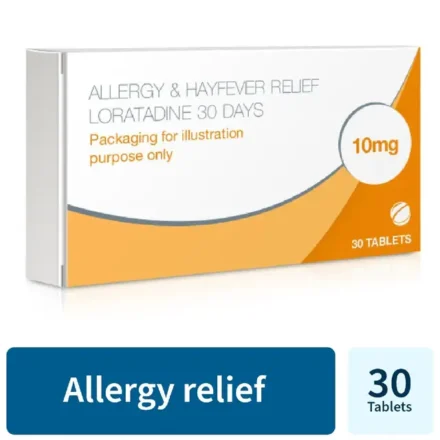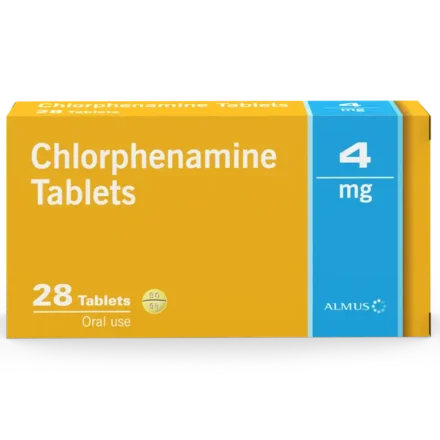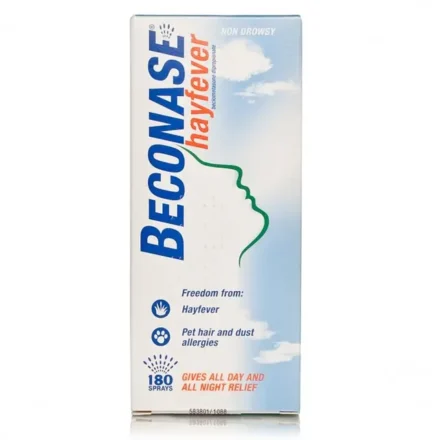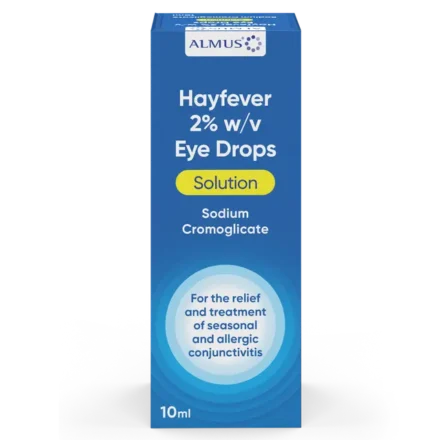- Your cart is empty
- Continue Shopping
Hay Fever Symptoms and Treatment UK | NHS Guide
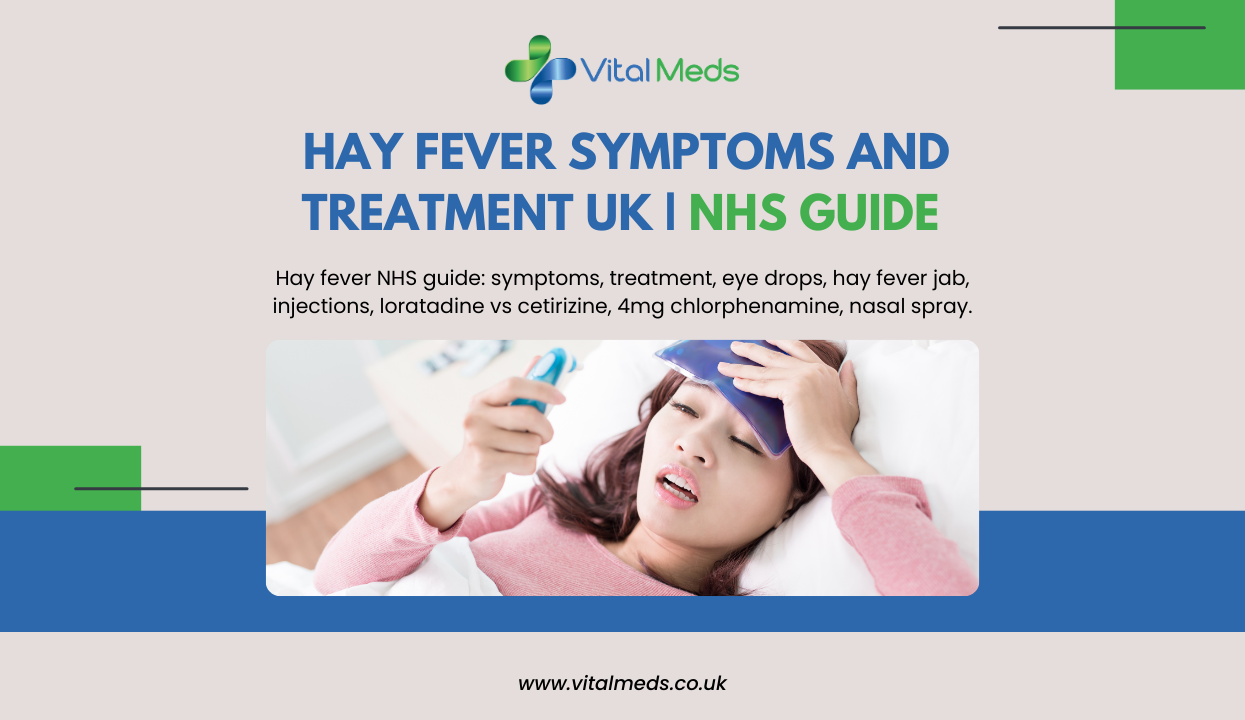
Hay Fever NHS Guide, also known as allergic rhinitis, is one of the most common seasonal conditions in the UK, affecting millions of people every year. It usually develops when the body’s immune system reacts to allergens such as pollen, dust mites, or mold. For many people, hay fever is simply an inconvenience, but for others it can significantly impact daily life by causing constant sneezing, itchy eyes, blocked nose, and general fatigue. The NHS recognises hay fever as a widespread condition and offers advice on how to manage it effectively.
We will explore hay fever symptoms, treatment options, NHS guidance, and the medicines most commonly used in the UK. We will also discuss products such as hay fever eye drops, nasal sprays, antihistamine tablets like loratadine and cetirizine, chlorphenamine, and steroid-based options like beclometasone nasal spray. Additionally, we will look at the role of hay fever injections or jabs, which are sometimes used in severe cases.
What is Hay Fever?
Hay fever is an allergic reaction triggered when the body comes into contact with allergens, most often pollen from trees, grasses, or weeds. When pollen enters the nose, throat, or eyes, the immune system mistakenly identifies it as a threat and releases histamine. This chemical reaction is what causes the classic hay fever symptoms.
In the UK, Hay Fever NHS Guide tends to be most common between late March and September when the pollen count is at its highest. During this time, many people experience symptoms almost daily, especially on warm, windy days. While there is no permanent cure, treatment and preventive measures can significantly reduce the impact of hay fever on everyday life.
Symptoms of Hay Fever
The symptoms of hay fever vary in intensity but are usually similar to those of a cold. The most common signs include:
People often complain of persistent sneezing, a blocked or runny nose, and itchy or watery eyes, sometimes referred to as “hay fever eyes”. Some individuals develop a sore throat or a dry cough caused by post-nasal drip. Fatigue and difficulty concentrating are also common, as dealing with constant discomfort can be draining. In some cases, frequent sneezing or excessive use of nasal sprays may even cause a hay fever bloody nose, which can be alarming but is usually not serious.
Unlike a cold, hay fever symptoms tend to last for weeks or even months, as long as a person remains exposed to allergens.
NHS Guidance on Managing Hay Fever
The NHS recommends several simple lifestyle changes alongside medicines to help reduce exposure to pollen. Patients are advised to keep windows and doors closed during high pollen days, especially in the early morning and evening. Showering and changing clothes after being outdoors can also help reduce pollen build-up. Wearing wraparound sunglasses can protect the eyes, and using petroleum jelly around the nostrils may help trap pollen before it enters the nasal passages.
For many patients, however, lifestyle changes alone are not enough, which is why medicines play a vital role in controlling hay fever symptoms.
Treatment Options for Hay Fever
There are a range of treatments available in the UK, many of which can be purchased directly from a pharmacy without the need for a GP prescription. These include antihistamine tablets, nasal sprays, eye drops, and in some cases, injections.
Antihistamine Tablets
Antihistamines work by blocking the effects of histamine, the chemical responsible for allergic symptoms. They are considered the first line of treatment for hay fever and are widely available in UK pharmacies.
Loratadine
Loratadine is one of the most commonly used antihistamines. It is a non-drowsy option, meaning it relieves sneezing, runny nose, and itchy eyes without making you sleepy. Many people find loratadine to be effective for day-to-day use.
Another popular choice is cetirizine, which is also a non-drowsy antihistamine. It works in a similar way to loratadine, but some individuals report that one is more effective than the other. This is why comparisons such as “loratadine vs cetirizine” are common among patients searching for the best option.
Buy Cetirizine for Hay Fever
Chlorphenamine 4mg
Unlike loratadine and cetirizine, chlorphenamine is a sedating antihistamine, which means it may cause drowsiness. For this reason, it is often taken at night to help patients sleep better while still controlling symptoms. It is also available in syrup form for children.
Buy Chlorphenamine 4mg
Nasal Sprays
For patients whose main symptoms are a blocked or runny nose, nasal sprays are highly effective. These sprays often contain steroids that help reduce inflammation in the nasal passages.
Beclometasone nasal spray is one of the most widely recommended options in the UK. It reduces swelling and irritation in the nose, making it easier to breathe and helping to relieve congestion. It is available from pharmacies and is also included in NHS guidelines for hay fever management.
Buy Beclometasone Nasal Spray
Eye Drops
Many people with hay fever experience sore, red, and itchy eyes. For these patients, eye drops provide fast and targeted relief.
Hay fever eye drops, such as sodium cromoglicate drops (often sold under the brand Optrex Hayfever Relief), are designed to reduce irritation and watering. They are safe for most people and can be used alongside antihistamine tablets and nasal sprays for maximum effect.
Buy Hay Fever Eye Drops
Hay Fever Injection / Jab
In severe cases where tablets, sprays, and drops do not provide enough relief, some patients choose to have a hay fever injection or jab. Often referred to as the Kenalog injection, this treatment involves a corticosteroid injection that helps to suppress the body’s allergic response for the duration of the pollen season.
It is important to note that the hay fever injection is not routinely offered by the NHS, but it is available privately at certain clinics and pharmacies across the UK. For patients with severe, life-disrupting hay fever, this can be a highly effective solution.
Book Hay Fever Injection
When to See a Doctor
Although Hay Fever NHS Guide can usually be managed with pharmacy treatments, patients should see a doctor if symptoms become severe or do not improve despite medication. Warning signs include persistent sinus pain, frequent nosebleeds, severe asthma attacks triggered by pollen, or side effects from medicines.
Conclusion
Hay fever is a widespread condition in the UK that can affect quality of life throughout the pollen season. While it cannot be cured completely, a wide range of treatments are available to control its symptoms. Options include antihistamine tablets such as loratadine, cetirizine, and chlorphenamine, steroid sprays like beclometasone, and hay fever eye drops for irritated eyes. For patients with severe symptoms, a hay fever jab may also be considered.
By following Hay Fever NHS Guide and using the right combination of medicines, most people can manage hay fever effectively and continue with their daily activities without major disruption.
FAQs for Hay Fever
Hay fever symptoms include sneezing, runny or blocked nose, itchy eyes, sore throat, and fatigue. In some cases, patients may also experience nosebleeds.
The most common medicines are antihistamines such as loratadine, cetirizine, and chlorphenamine. Beclometasone nasal spray and hay fever eye drops are also widely used.
The NHS does not routinely offer hay fever injections, but private clinics and some pharmacies in the UK provide steroid jabs like Kenalog for severe cases.
Both are non-drowsy antihistamines. Loratadine is less likely to cause sleepiness, while cetirizine may make some people feel slightly drowsy.
Yes, hay fever often leads to red, itchy, and watery eyes, known as “hay fever eyes”. Using hay fever eye drops can provide fast and effective relief.


